Changelog
Stay updated with the latest features and improvements
November 13, 2025
CLIv1.7.1
Added support to define hooks on asset analyzed events
Small release to add support to define hooks on
asset_analyzed events. This event is triggered when jxscout finishes the analysis of a file.Check release 1.7.0 for more details on hooks.
Check https://github.com/francisconeves97/jxscout-pro-hooks for some examples of how you can use hooks.
November 11, 2025
CLIv1.7.0
You can now run your own commands using hooks!
This release introduces a way for you to extend jxscout by defining your own hooks on jxscout events.
To enable this feature you can use
config custom-hooks-enabled=true on the jxscout prompt.This will create a
hooks.jsonc file in the ~/jxscout/hooks.jsonc that you can use to define arbitrary shell commands that run on different jxscout events.
{
// global hooks that are executed for all projects
"global": {
// // asset_saved is triggered when a raw JS file or HTML file is saved
// // includes chunks and inline JS too
// "asset_saved": {
// // cmd is the shell command to execute when the event is triggered.
// // The event JSON is passed via stdin to the shell command defined on the "cmd" field.
// // The JSON will contain the following fields:
// // - asset: object containing:
// // - file_path: the absolute path where the file is saved
// // - url: the URL where the file is served from
// // - content_type: the content type of the file (HTML or JS)
// // - is_inline_js: true if the file is inline JS (only for JS files)
// // - is_discovered_chunk: true if the file is a discovered chunk (only for JS files)
// // - project: the name of the project
// // - project_working_directory: the working directory path for the project
// "cmd": "json=$(cat); logfile=$(echo "$json" | jq -r ".project_working_directory + \"/asset_saved.log\""); echo "$json" >> "$logfile""
// or in Windows
// "cmd": "$json = ($input | Out-String).Trim(); Add-Content -Path 'C:\Users\fneves\asset_saved.log' -Value $json"
// For reference, on Linux/MacOS cmd is wrapped in sh -c "..."
// and on Windows cmd is wrapped in powershell -NoProfile -Command "..."
// },
// // asset_beautified is triggered after beautification of the same files as asset_saved
// "asset_beautified": {
// // cmd is the shell command to execute when the event is triggered.
// // The event JSON is passed via stdin to the shell command defined on the "cmd" field.
// // The JSON will contain the following fields:
// // - asset: object containing:
// // - file_path: the absolute path where the beautified file is saved
// // - url: the URL where the file is served from
// // - content_type: the content type of the file (HTML or JS)
// // - is_inline_js: true if the file is inline JS (only for JS files)
// // - is_discovered_chunk: true if the file is a discovered chunk (only for JS files)
// // - project: the name of the project
// // - project_working_directory: the working directory path for the project
// "cmd": "json=$(cat); logfile=$(echo "$json" | jq -r ".project_working_directory + \"/asset_beautified.log\""); echo "$json" >> "$logfile""
// },
// // reversed_sourcemap_saved is triggered when a reversed sourcemap is saved
// "reversed_sourcemap_saved": {
// // cmd is the shell command to execute when the event is triggered.
// // The event JSON is passed via stdin to the shell command defined on the "cmd" field.
// // The JSON will contain the following fields:
// // - asset: object containing:
// // - file_path: the absolute path where the reversed sourcemap file is saved
// // - project: the name of the project
// // - project_working_directory: the working directory path for the project
// "cmd": "json=$(cat); logfile=$(echo "$json" | jq -r ".project_working_directory + \"/reversed_sourcemap_saved.log\""); echo "$json" >> "$logfile""
// }
},
"projects": {
// // project-specific hooks that are executed for the given project
// "myspecialproject12333": {
// "asset_saved": {
// "cmd": "json=$(cat); logfile=$(echo "$json" | jq -r ".project_working_directory + \"/special_asset_saved.log\""); echo "$json" >> "$logfile""
// }
// }
// "<project_name>": {
// "asset_saved": {
// "cmd": "..."
// },
// "reversed_sourcemap_saved": {
// "cmd": "..."
// },
// "asset_beautified": {
// "cmd": "..."
// }
// }
}
}October 31, 2025
CLIv1.6.2
Fixed saving files of hosts with unconventional ports on Windows
This is a small patch release that fixes a bug where files of hosts with unconventional ports on Windows were not being saved correctly.
October 18, 2025
CLIv1.6.1
Introduced new experimental options for better configurability
This release introduces some new experimental options to help you configure jxscout better. Check https://docs.jxscout.app/docs/features-overview/projects-and-configuration#configuration for more details on how to change configurations.
Working directory option
Added a new option
working-directory to configure the working directory for jxscout. If unset, jxscout will use the ~/jxscout directory.⚠️ IMPORTANT: This configuration should only be changed on empty projects, otherwise some files might be saved in one working directory and some files in another directory which will break jxscout asset relationships. After you change this configuration, it will be used by default for all future new projects.
⚠️ IMPORTANT: I recommend to backup your
~/jxscout and ~/.jxscout directories before testing this experimental option.Upstream proxy (Caido/Burp) options
Two new options were introduced to configure jxscout to proxy requests through your proxy:
upstream-proxy-hostname and upstream-proxy-port.This is an optional configuration, but if configured jxscout will proxy requests to fetch discovered webpack chunks through your proxy so they will be logged on your Burp or Caido instance.
option to control sourcemap reversal
Added a new option
enable-source-map-discoverer which is enabled by default. When disabled, jxscout will not attempt to reverse sourcemaps.September 27, 2025
CLIv1.6.0
Improved performance for loading large projects and other improvements
This release includes improvements for loading large projects and other improvements.
Performance Improvements
jxscout now loads descriptors page by page, improving the UX when loading large projects.
Other Improvements and Bug Fixes
- Fixed a bug where discovered chunks containing invalid path characters were not being downloaded.
- Fixed a bug where websites that had a referer policy which didn't send the Referer header were not being tracked.
VSCode Extensionv1.5.0
Improved performance for loading large projects and other improvements
This release includes improvements for loading large projects and other improvements.
Performance Improvements
jxscout now loads descriptors page by page, improving the UX when loading large projects.
Other Improvements and Bug Fixes
- Fixed a bug where some descriptors were not being shown when viewing findings for optimized files.
September 14, 2025
CLIv1.5.0
Instant descriptor updates on VSCode and analyzer improvements
This release continues the real-time improvements from version 1.3.0. Both descriptors and assets views now update in real-time, significantly improving the user experience. Please update the VSCode extension to version 1.4.0 to get the latest features.
Instant Descriptor Updates in VSCode
jxscout now emits updates of discovered descriptors incrementally to VSCode.
This completes the real-time updates implementation for the VSCode extension.
New Secret Analyzers
- Added a secret detector that identifies sensitive variable names.
- Added a secret detector that identifies high-entropy strings.
Other Improvements and Bug Fixes
- Fixed an edge case where chunks were not downloaded when the server responded with Content-Encoding but didn't actually encode the content.
- Fixed an edge case where analysis failed when some identified matches contained invalid JSON characters.
- Fixed scenarios where the paths analyzer generated duplicate matches for string concatenation (e.g.,
'/api'.concat('/users')would match both'api'and'api'.concat('users')). - The optimizer now uses the same prettier settings as regular files, avoiding duplicate findings.
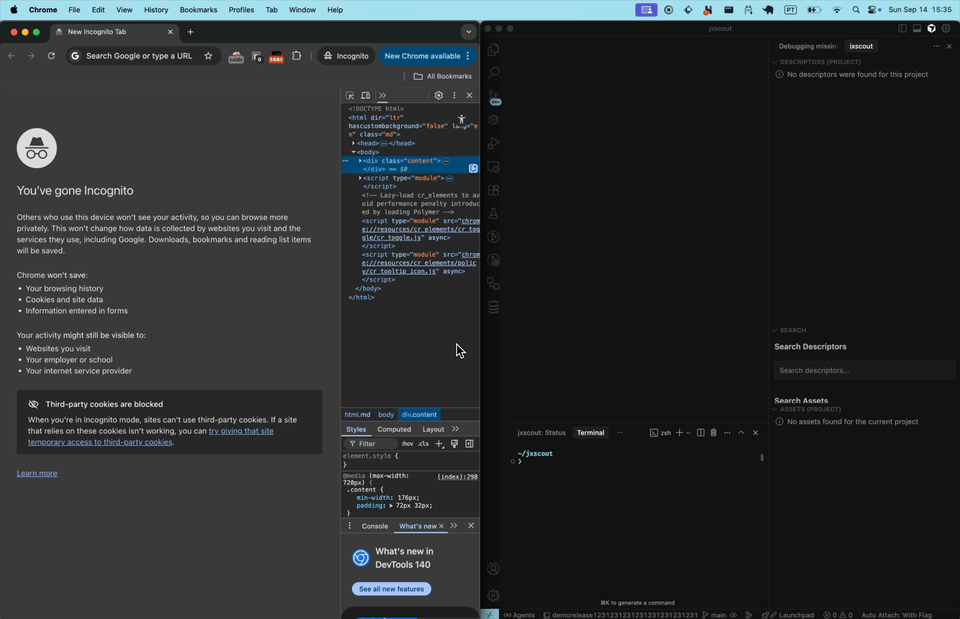
VSCode Extensionv1.4.0
Instant descriptor updates support and other improvements
This release includes support for instant descriptor updates and other improvements. Please update the CLI version to 1.5.0 as well to get the latest features.
- Added support for instant descriptor updates. jxscout will now emit descriptor updates incrementally to VSCode.
- You can now right-click on the assets view to filter descriptors.
- Added counts to the assets view.
August 31, 2025
CLIv1.4.0
Automatic Next.js Chunk Discovery, instant updates on VSCode, and other improvements
This is a big release that includes UX improvements, bug fixes, and new features. Please update the VSCode version to 1.3.0 as well to get the latest features.
Next.js Chunk Discovery
jxscout now automatically finds _buildManifest.js files and analyzes them to find lazy loaded chunks.
This will greatly improve your coverage on Next.js applications.
Instant Asset Updates on VSCode
jxscout will now emit updates of discovered assets incrementally to VSCode.
This is the first step towards a better UX where you will see real-time updates in VSCode without needing to refresh the views.
Other Improvements and Bug Fixes
- Fixed a bug in asset relationship tracking where JavaScript files that load other JavaScript files were not being tracked.
- Fixed an edge case in the chunk discoverer where certain chunks were not being detected.
- Fixed a bug in sourcemap reversal where reversed sources were being written to locations outside the sourcemaps directory.
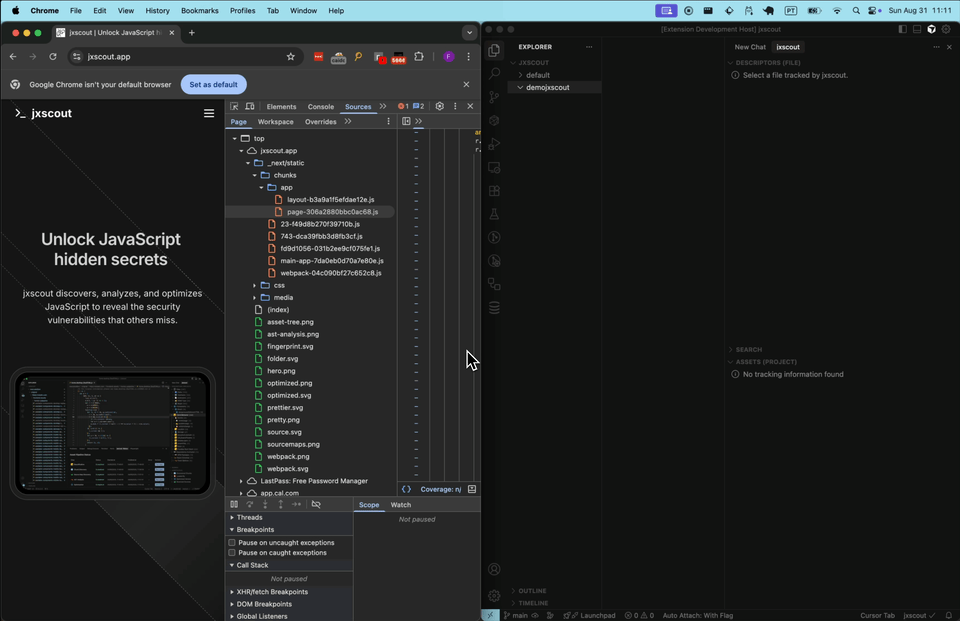
VSCode Extensionv1.3.0
Instant asset updates support and other improvements
This release includes support for instant asset updates and other improvements. Please update the CLI version to 1.4.0 as well to get the latest features.
- Added support for instant asset updates. jxscout will now emit updates of discovered assets incrementally to VSCode.
- You can now copy asset URLs to the clipboard by right-clicking on assets in the asset view.
- Improved fuzzy matching for asset search.

August 11, 2025
CLIv1.3.0
CLI client introduction and optimizer improvements
This release introduces a new CLI for extracting information from jxscout and includes optimizer improvements.
CLI client
You can now use
jxscout -c to enter client mode.This provides an alternative way to extract information from jxscout without using the VSCode extension. Here are some example commands:
$ jxscout -c descriptors --descriptor-types paths # Returns all paths found in the current project$ jxscout -c descriptors --descriptor-types graphql # Returns all GraphQL queries and mutations found in the current project$ jxscout -c js-files -only-chunks --print-urls # Prints the URLs of all webpack chunks found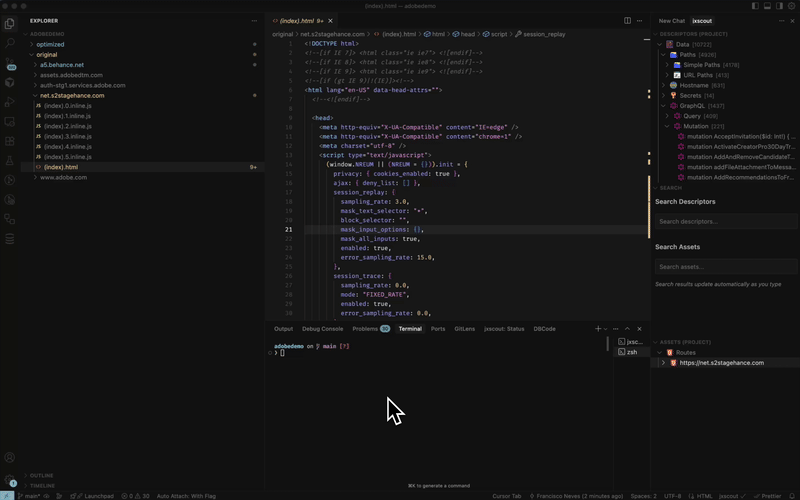
Optimizer Improvements
The previous optimizer I created for the MVP was very memory and CPU intensive. This release took a while because I had to essentially rewrite the optimizer from scratch.
During this process, I identified some issues with the previous optimizer processors that sometimes created invalid JavaScript, and removed some processors that were too aggressive. There will be files that jxscout won't be able to optimize, but over time I'll continue solving edge cases to provide a better experience.
I also added a new processor that optimizes code like
JSON.parse('{"a": "b"}' to {"a": "b"}, which is a common pattern in minified code.July 22, 2025
CLIv1.2.1
Improved authenticated JS fetching
This release fixes several bugs that will improve jxscout's completeness:
- Fixed a bug where jxscout was not downloading webpack chunks that required authentication.
- Fixed a bug where jxscout was not downloading source maps that required authentication.
- Fixed a bug where jxscout was not downloading
application/ld+jsoninline scripts.
July 20, 2025
CLIv1.2.0
MCP Server release and performance improvements
This release introduces the MCP server and various performance improvements.
MCP Server
The era of hackbots is here, and jxscout is ready to help you build them. This version introduces an MCP server with 3 tools that can help you build hackbots:
get_html_routes- Allows the agent to retrieve all HTML pages tracked by jxscout for the current project.get_js_files_loaded_by_html_file- Allows the agent to list all loaded JavaScript files for a given route. This includes discovered Webpack chunks, reversed sourcemaps, and optimized versions of the JavaScript files.get_static_analysis_results_for_file_paths- Allows the agent to retrieve static analysis results from jxscout. This enables the agent to get discovered paths and other relevant parts of the code, so it can focus on what's important.
By default, the MCP server runs on port 3334 under the /mcp route. You can use the
config command in the CLI to change the port. Here is an example configuration for Cursor:{
"mcpServers": {
"jxscout": {
"url": "http://localhost:3334/mcp"
}
}
}This is the first version of the MCP server. I'm excited to get feedback on other tools you would like to see.
Miscellaneous Improvements
- The query to get project-level descriptors was improved and should now be faster.
- Descriptors are now sorted alphabetically by default.
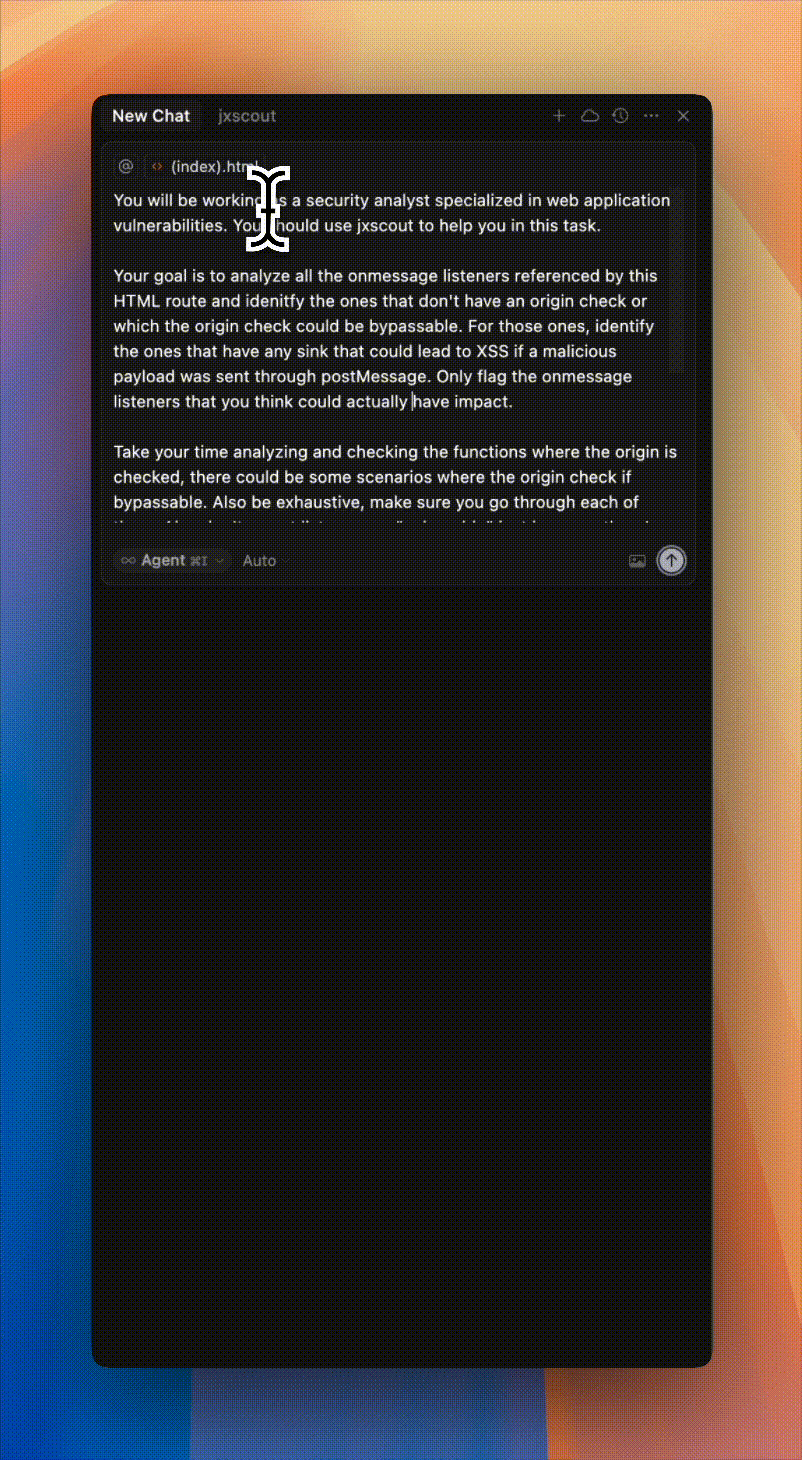
VSCode Extensionv1.2.0
Performance and navigation improvements
This release includes some quality of life improvements to the VSCode extension.
- Deprecated the toggle sort button since results are now sorted automatically by the backend.
- You can now quickly navigate to specific routes of the current project by bringing up the VSCode command palette (Ctrl+Shift+P) and selecting "jxscout: Go to Route".
- Project level views are now cached in memory, so you can switch between File and Project scope without waiting for the results to be loaded from the backend.
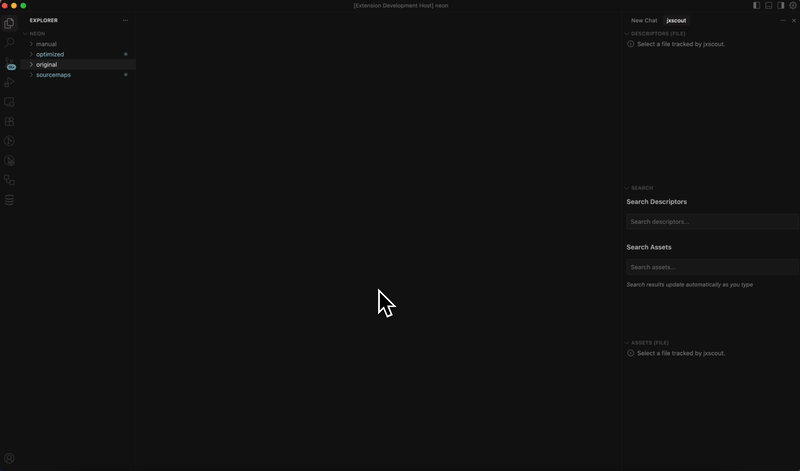
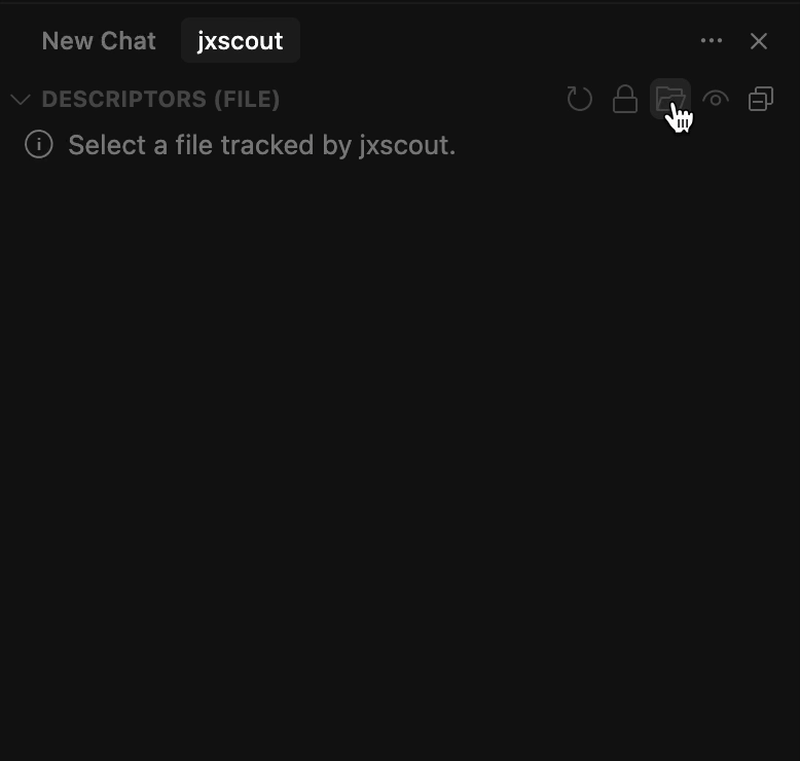
July 13, 2025
CLIv1.1.0
Improved asset discovery and navigation
This is a major release that introduces numerous important bug fixes and improvements to asset navigation in VSCode. Although there should be no breaking changes, I recommend creating a backup of your existing projects as there were some changes in how sourcemaps are saved.
To back up your projects, you can use the following commands:
$ cp -R ~/jxscout ~/jxscoutbak$ cp -R ~/.jxscout ~/.jxscoutbak⚠️ This release has only been tested on macOS. If you are on a different OS, please let me know if you encounter any issues.
Webpack Chunk Discovery
- Fixed a bug where websites that returned a 200 with HTML content for brute-forced webpack chunks caused jxscout to download those "No Content" HTML pages.
Reversed Sourcemaps
- Improved how reversed sourcemaps are saved to disk. Previously, all reversed sourcemaps were saved underneath the hostname path, but this could cause conflicts between different parts of the application with available sourcemaps.
- Sourcemaps are now saved in a directory relative to where they were found (e.g., https://example.com/assets/js/app.js.map will be saved to example.com/assets/js/src/...).
- This change mimics how sourcemaps are reversed and shown in the "Sources" tab of Chrome.
Improved Asset Relationship Tracking
- Scripts loaded with the
crossoriginattribute were not being related to the loading route. This is because jxscout relied on the Referer header to determine the loading route, but with that attribute set, the Referer header is not sent. - jxscout now keeps track of scripts loaded by HTML pages and attempts to relate them to the loading route.
Improved Asset Navigation
- Implemented the backend changes to support the new asset navigation updates in VSCode.
- See the VSCode 1.1.0 changelog for more details.
VSCode Extensionv1.1.0
Improved asset discovery and navigation
This release includes numerous improvements to the UX for navigating assets in the VSCode extension. Please update the CLI version to 1.1.0 as well to get the latest features.
Added ability to hide descriptors
jxscout has many descriptors, and some of them might not be relevant to you. You can now hide descriptor types by right-clicking on them.
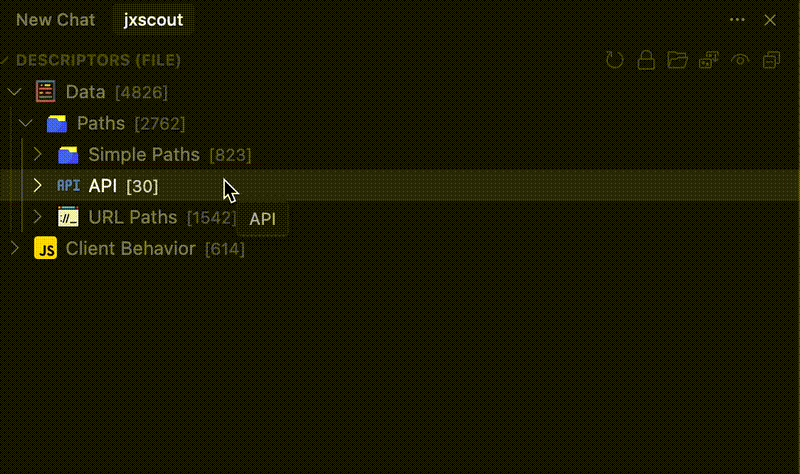
Improved asset navigation
The assets view now shows the assets in a tree structure, making it easier to navigate.
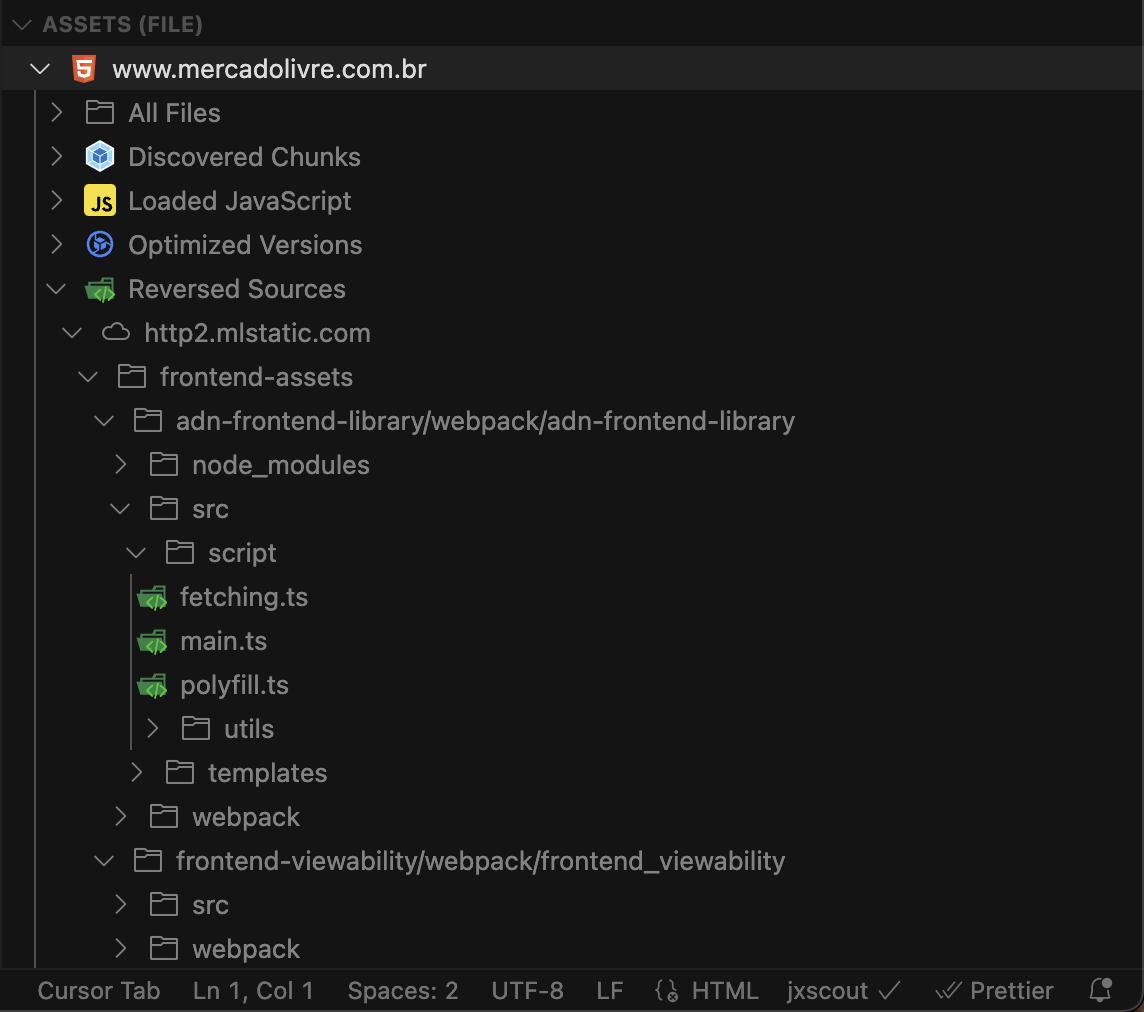
Ability to "lock" views
When changing between files, the descriptors and assets views update their results by default. You can now lock those views to prevent updating them when jumping between files.
This feature should be useful when analyzing a particular route. You can select the HTML file you want to analyze, which will make jxscout load all the assets/descriptors for that route. Then you can lock the views and analyze all the relevant code for that route.
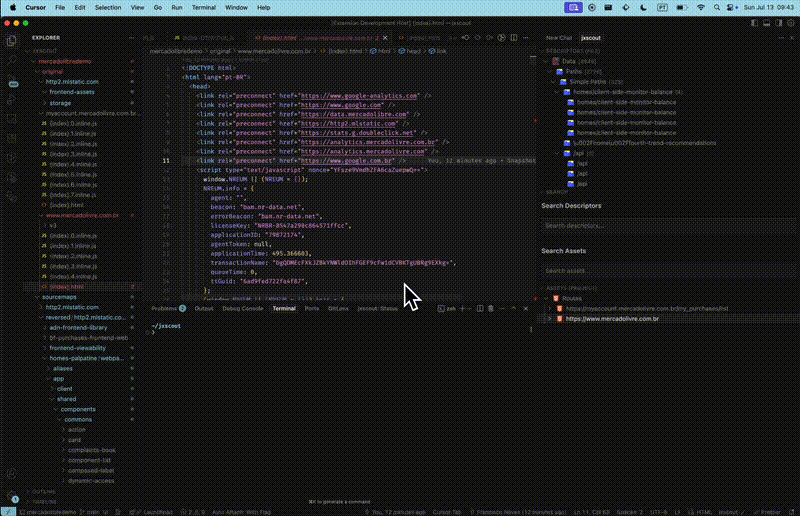
Improved asset search
The previous version's search view was not very useful. Now search is done in memory and updates in real time, which should result in a better user experience.
You can also search for assets within the "Assets" view by bringing up the VSCode command palette (Ctrl+Shift+P) and selecting "jxscout: Go to Asset", which opens a quick pick view to search for assets.
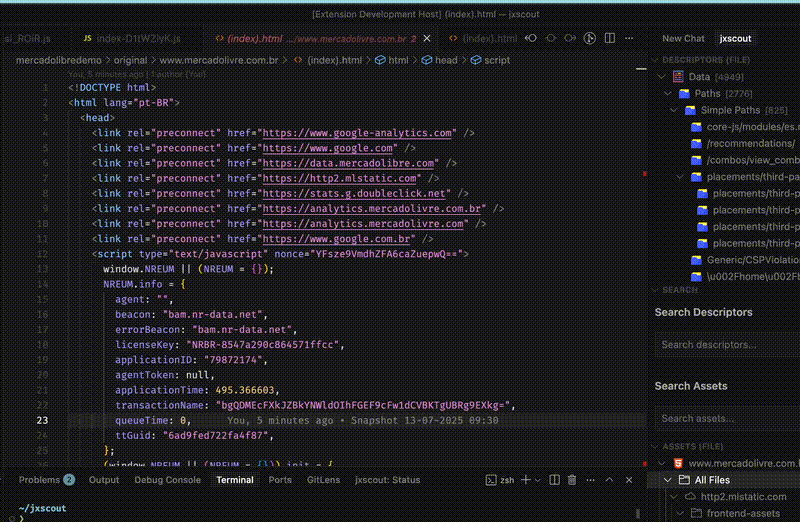
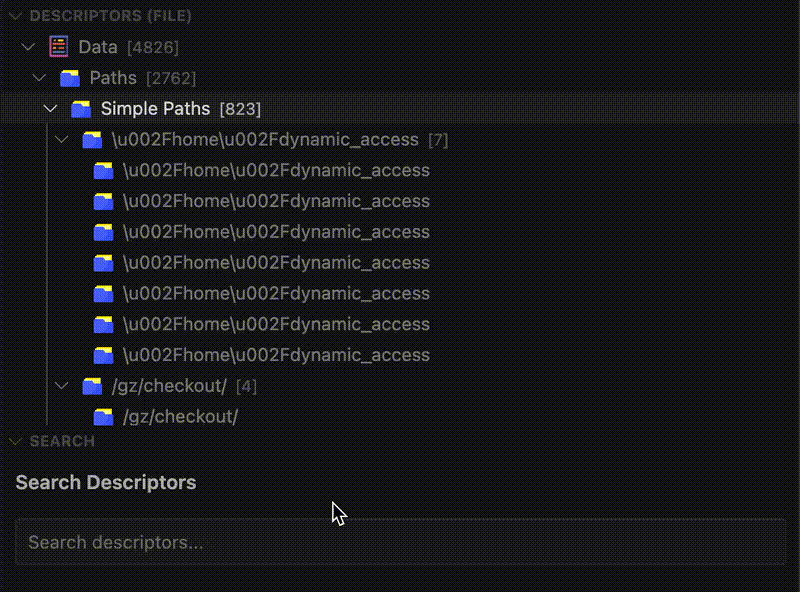
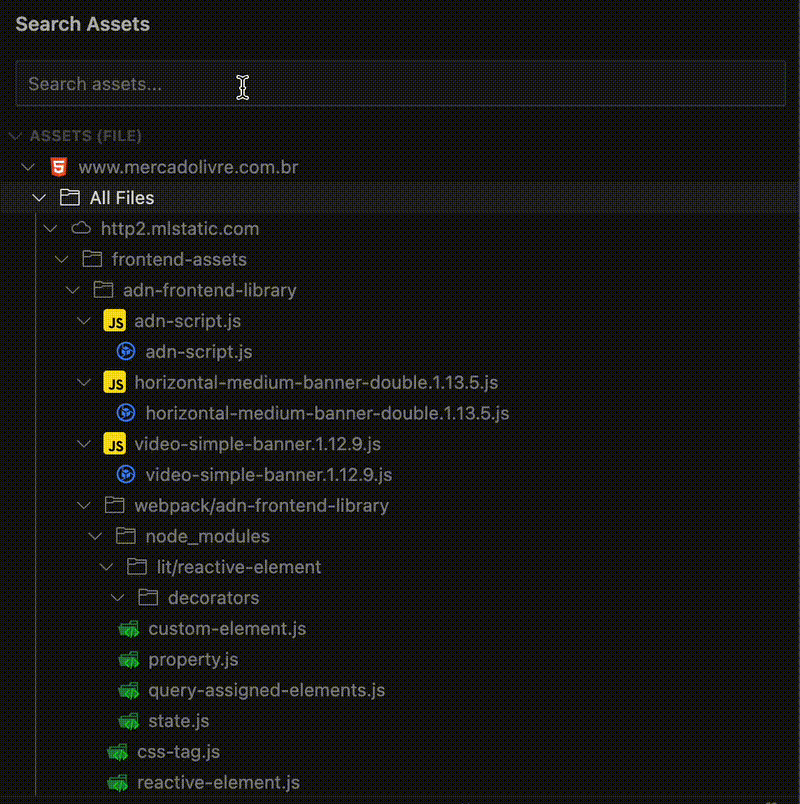
July 6, 2025
CLIv1.0.0
Get descriptors for selected files
This is the first release of jxscout pro with a proper changelog. Going forward, every release will include detailed changelog entries to better communicate changes to users.
This release also introduces a new versioning scheme. Previously, releases were versioned using dates, but this approach doesn't work well for versioning. I've now adopted semantic versioning for better compatibility and clarity.
Versioning: Semantic Versioning
Adopted semantic versioning (major.minor.patch) with the following rules:
- Major: Incremented when breaking changes are made to the communication protocol with the VSCode extension.
- Minor: Incremented when new features are added.
- Patch: Incremented when bugs or small improvements are made.
New Feature: Multi-file Descriptor Selection
You can now select multiple files or directories in VSCode to get descriptors for them simultaneously. This provides a more efficient workflow when analyzing multiple files.
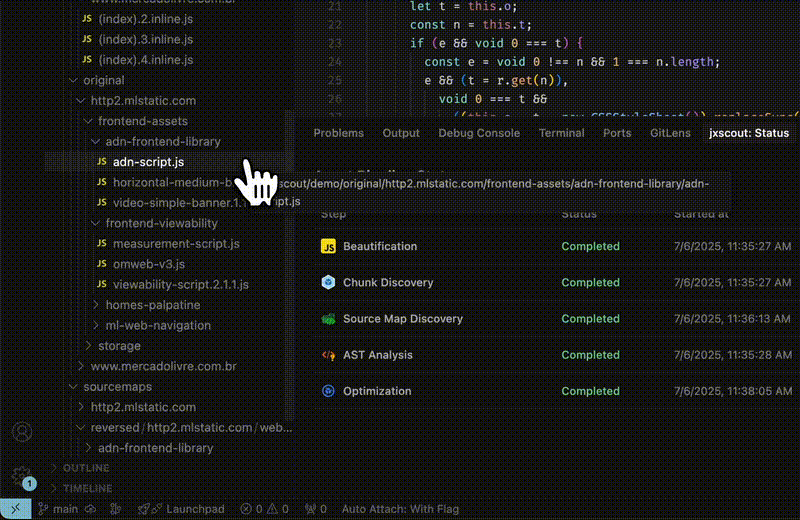
Improvements and Bug Fixes
- Deprecated the "Filter descriptors by file path" search box in favor of the new multi-file selection feature.
- Added the ability to cancel in-flight requests when switching away from the project-level descriptors view.
- Duplicate descriptors are now automatically collapsed into single entries for cleaner visualization.
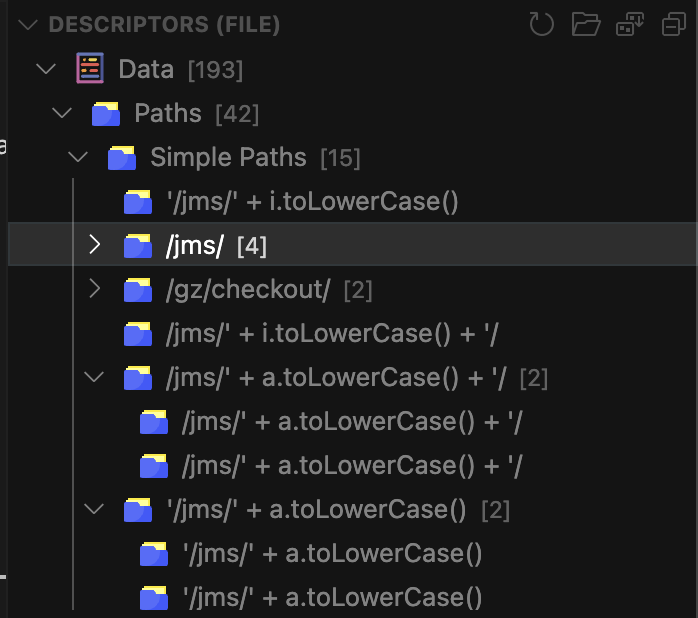
VSCode Extensionv1.0.0
Get descriptors for selected files
Implemented changes to support getting descriptors for selected files. See the CLI changelog for more details.